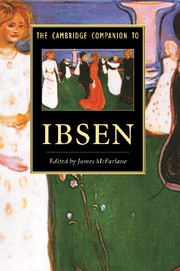Book contents
- Frontmatter
- 1 Ibsen's dramatic apprenticeship
- 2 Ibsen and historical drama
- 3 Dramatic and non-dramatic poetry
- 4 Ibsen and comedy
- 5 Ibsen and the realistic problem drama
- 6 Ibsen and feminism
- 7 The middle plays
- 8 The last plays
- 9 Ibsen's working methods
- 10 Ibsen and the theatre 1877-1900
- 11 Ibsen and the twentieth-century stage
- 12 Ibsen on film and television
- 13 On staging Ibsen
- 14 Ibsen and the drama of today
- 15 A century of Ibsen criticism
- 16 Works of reference
- Index
1 - Ibsen's dramatic apprenticeship
Published online by Cambridge University Press: 28 May 2006
- Frontmatter
- 1 Ibsen's dramatic apprenticeship
- 2 Ibsen and historical drama
- 3 Dramatic and non-dramatic poetry
- 4 Ibsen and comedy
- 5 Ibsen and the realistic problem drama
- 6 Ibsen and feminism
- 7 The middle plays
- 8 The last plays
- 9 Ibsen's working methods
- 10 Ibsen and the theatre 1877-1900
- 11 Ibsen and the twentieth-century stage
- 12 Ibsen on film and television
- 13 On staging Ibsen
- 14 Ibsen and the drama of today
- 15 A century of Ibsen criticism
- 16 Works of reference
- Index
Summary
In retrospect the 1840s appear relatively undramatic in Norwegian literary history. Writers were mostly cultivating collective memories and giving written form to folk tales and popular ballads and in other ways working on the construction of a national mythology, in historical studies as well as in poetry. There was no permanent theatre established in the country, although several towns by this time had more or less appropriate theatre buildings where itinerant theatre companies, mostly Danish, could perform vaudevilles and plays according to the popular taste of the small bourgeois audiences.
Theatrical activity in Norway was nothing more than a pale reflection of a Danish tradition which seemed to be losing the vigour it had enjoyed in the early decades of the century. Under such circumstances it was understandable that practically nobody in Norway was giving much attention to the art of writing for the theatre. In Grimstad the young assistant pharmacist Henrik Ibsen had no chance to acquaint himself with the standards and techniques of professional theatrical performance, but he must have been an avid reader of classical and contemporary literature. His reading in those early years included dramatic works by Shakespeare, Schiller, Ludvig Holberg and Adam Oehlenschlager, and his literary talent and ambitions were clearly recognized by his few intimate friends. At this point it was not Ibsen's primary intention to earn his living as a writer. In his spare time he was busy preparing himself for the entrance examination to the University of Christiania, where he hoped to be accepted as a student of medicine.
- Type
- Chapter
- Information
- The Cambridge Companion to Ibsen , pp. 1 - 11Publisher: Cambridge University PressPrint publication year: 1994
- 1
- Cited by

